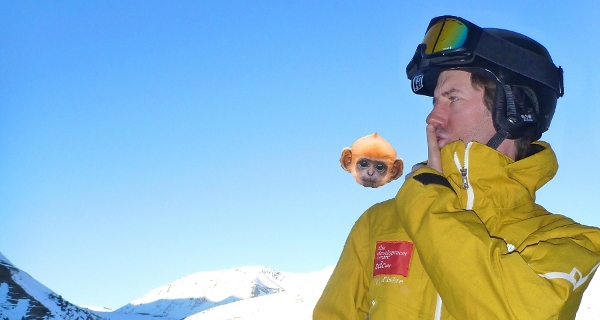Have you ever heard a little monkey on your shoulder as you descend the pistes? It may have a very insistent way of commenting on anything you do, and will not hesitate to tell you how rubbish you just skied that run or how steep the next pitch looks…

The monkey pretends to be doing you a favour as it reminds you of all your previous failures. It never supports you in what you are doing and it will insist on the fact that you will never achieve results. The monkey tends to speak in negative tones. It judges, worries, comments, compares and complains. The monkey is an outer image of how some of our minds work when they are left to their own device, untrained and untamed.
For various reasons some of us listen too much to our monkeys! We have become so used to the internal background commenting on our lives that we mostly forget that we do have a say in the matter. We could spiral downwards as this repetitive negative self talk influences our performance; learning could therefore easily becomes full of fears. In this instance, we are less likely to take risks, real or perceived. This has a potential to stop our growth and learning and can leave us feeling deflated.
When out coaching our clients, friends, (and even colleagues), we come across a fair few of these shoulder monkeys, and managing the louder ones is an essential part of what we do. We all have one and the moment we recognize our own monkey/negative self talk and learn to control it, our ability to learn improves rapidly and greatly. This psychological factor, is for some, a far more critical focus towards improving our skiing than any technical input.
But how do we manage the monkey and turn negative self talk into positive self talk? How do we train it?
To start with, you have to make a decision. You have to be willing to take the risk of stepping out of your comfort zone. Let go of the control. Be aware that doing this makes the monkey jump and scream on your shoulder! Take no notice of it! You want to do this because this is where we know we learn new skills. Learning starts where your comfort zone ends. You must accept the feeling of being vulnerable and uncomfortable.
Tell your monkey to stay calm and carry on. Be focussed on what you want, not the monkey.
For the TDC coaches, whatever your level, this is the very core of why we love our jobs so much! Helping people make that jump and realize that they still have two feet to stand on, is très rewarding. Monkey negotiation is amongst our favourite disciplines and a lot of our experience obviously comes from training and taming our own monkeys.
Listen to your thoughts….
Be witness to what your monkey is telling you. Just listen though, don’t evaluate or judge.
You will soon realise the separation between the voice of the monkey and you. This will give you the insight to change your self talk. Are you filled with self doubt? Do you tell yourself that you can’t do it? When your heart is racing, and you fail to commit, your monkey can beat you up for being ‘weak and useless’. You can even visualize yourself tumbling down the piste, and you haven’t even started! Is it the same old record playing over and over again?
Once you learn to witness your thoughts you can take charge of them, the monkey will lose its power. You will have started the process of taming and training your monkey.
Secondly….
If your monkey is being very loud and you can hear the negative self talk, think STOP! Visualize a big red/white stop sign. Give yourself a moment to clear your mind and replace the negative talk with positive self talk.
For example let your sentences start with I will… instead of I can’t… Tell yourself what you want to do. “I am learning to be a great skier”, “I will make 10 smooth relaxed rounded turns Now”. Mime a song and ski along to the rhythm. Really simple realistic positive affirmations like these can shut off the negative self talk. It does take practice and perseverance but over time control of self talk can become a very powerful tool in your tool box.
Override the negative self talk, and it will help you maintain control over personal feelings and behaviours, thus gaining confidence and improving learning.
Lastly….
Laugh at yourself… A lot! Have fun. You are allowed to be less than perfect. Take a leap of faith and you might fall but you might also succeed. If we hang out in our comfort zones, we mistakenly attach ourselves to the idea that the world is a predictable safe place. That is an illusion which can set us up for frustration and disappointment. Learning is change. Change implies that something is done differently, and it starts with our thoughts, with ourselves. With a choice.
So next time you go out in the mountains, have fun, take that monkey for a ski, find the edge of your comfort zone and then leave it (take care, and maybe listen a bit when jumping off cliffs though).
We would love to hear any stories about your monkey and how you may have trained it.
Coach Lena works to eradicate and make extinct shoulder monkeys, but it should be noted that she loves all furry animals and is very almost a vegetarian [ed].
